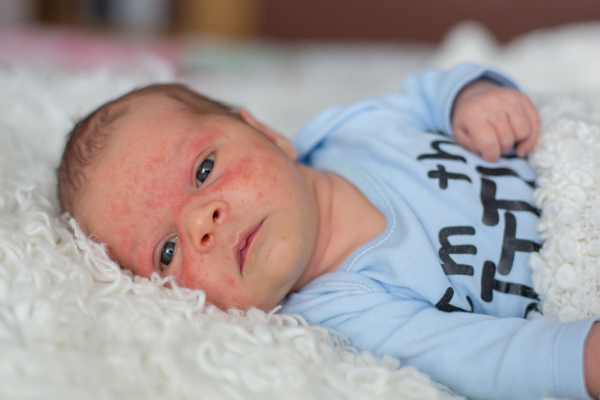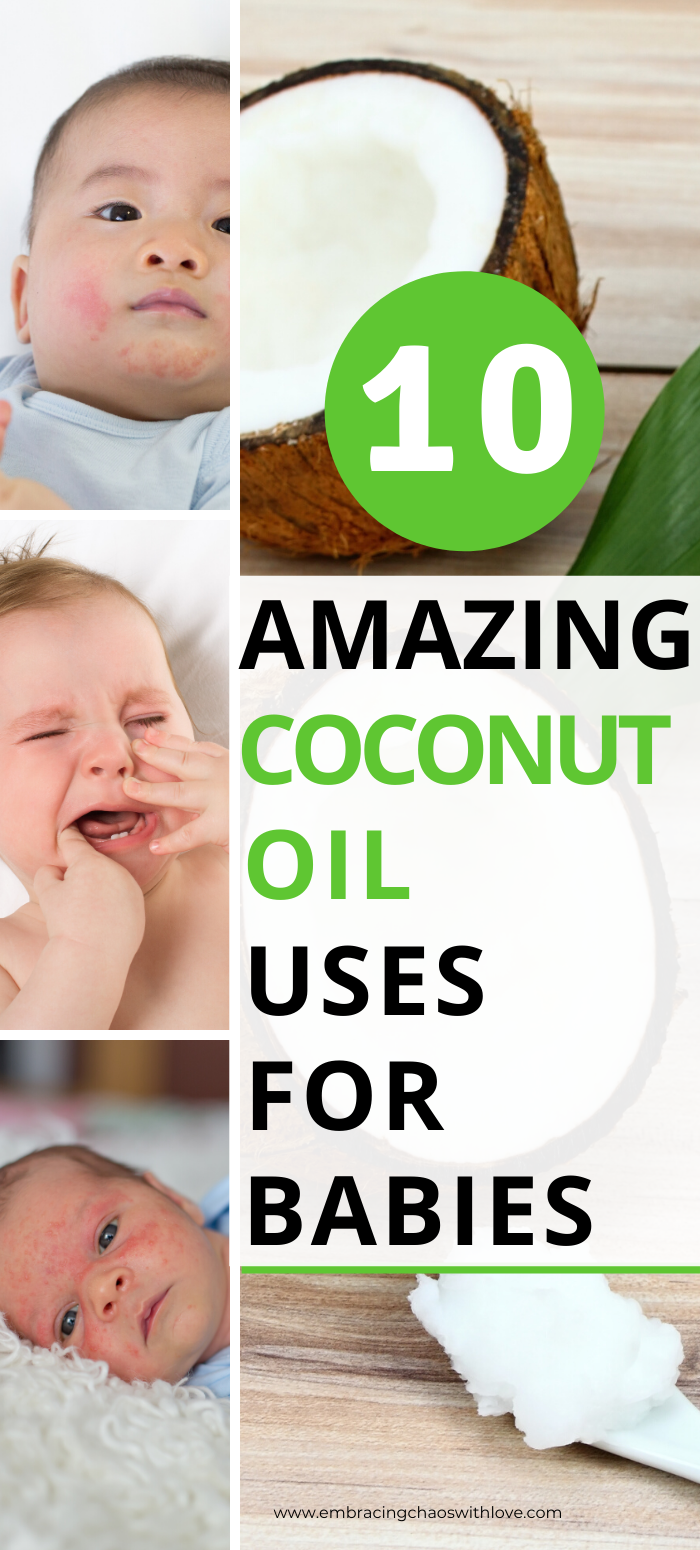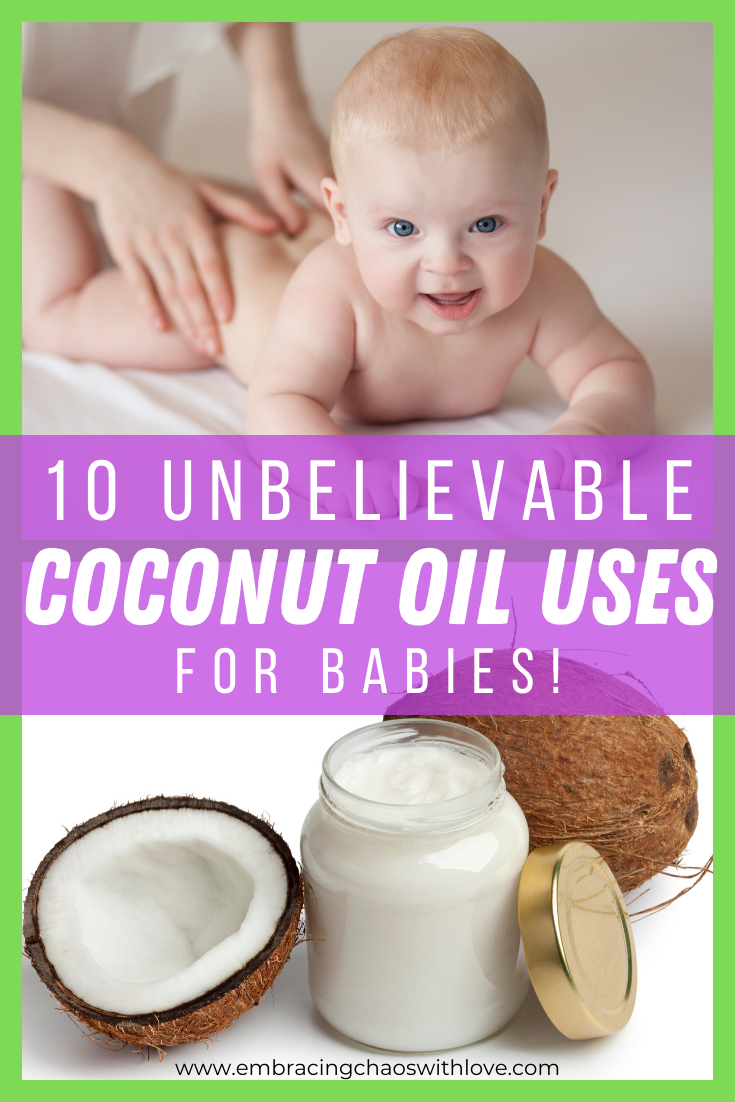Coconut oil is a wonderful natural product to use on babies. As moms, we are always looking for the best natural option to treat our babies. There are a lot of benefits to using coconut oil on babies. So many products on the market these days have so many chemicals you don’t even know what you are truly putting on your baby.
I was astounded at all the uses and benefits that pure coconut oil provides for babies. As a new mother, I was excited to try it, and boy did it deliver. I love it! I still use it on my kids today and on myself as well.
Why should I use coconut oil on my baby?
Coconut oil has antimicrobial, anti-inflammatory, and antioxidant properties. This makes coconut oil perfect to use on babies. It is a natural product for both external and internal uses.

The saturated fats in coconut oil are in Medium Chain Triglycerides (MCTs), which make them easily digestible and are considered healthy fats. When coconut oil is consumed, the MCTs get transferred straight to the liver for energy production.
You want to make sure to get Unrefined Organic Coconut Oil when you are using it for your baby. It is extracted from fresh coconut and treated in a way that preserves all of the beneficial properties. It also has the highest amount of antioxidants.
Best Coconut Oils to Use on Babies
How do you use coconut oil on babies?
Given all the natural benefits it provides, the uses of coconut oil are endless. There are, however, some especially great uses for coconut oil when it comes to a new baby and their sensitive skin.
1. Get Rid of Cradle Cap Naturally
A great baby tip for new parents is to use coconut oil for the baby’s hair to get rid of the cradle cap. Cradle cap is ubiquitous in newborns. It can be patchy scaly crusts on the scalp or very oily or dry skin with flaky white or yellow scales. It is mostly on the baby’s scalp but can also be on the face (usually ears and nose) or groin area.
The patches are not itchy or uncomfortable for the newborn; they are just difficult to remove. This is where coconut oil comes in.
Apply some coconut oil directly in the baby’s scalp or to the affected areas of baby’s delicate skin and let it sit for 10-20 minutes. Then use a soft brush to gently comb the flaky scalp. Be very gentle.
Rinse with lukewarm water. You may have to repeat. Just remember to be gentle and don’t scrub the affected area.
2. Cure Baby Eczema
Baby eczema or atopic dermatitis is a condition most babies get during their first few months. It can look like patches of red or dry skin. It mostly affects their face and joints of their arms and legs, but it can show up anywhere on their body.

Your baby will most likely outgrow it, but in the meantime, you can use coconut oil for baby eczema. Baby eczema can be itchy and irritating, which could cause them to scratch it and make it worse on their delicate skin.
How to use coconut oil for your baby’s atopic dermatitis
Apply coconut oil as a moisturizer daily to soothe and hydrate the affected area. It will gradually treat eczema symptoms.
3. Relieve Diaper Rash Quickly
Babies get diaper rash quite easily during their first few months. Baby’s have sensitive skin and the smallest irritation can cause diaper rash.
Coconut oil can act as a barrier on babies skin to prevent any further irritation and help heal the existing diaper rash. This is especially helpful if they are experiencing a lot of runny poops leading to diaper blowouts.
Apply to the groin area during every diaper change to treat irritated skin. This is also a great alternative to other diaper rash creams because it does not ruin cloth diapers. You can also use as a baby wash during bath time to soothe their skin from a diaper rash or baby’s eczema.
4. Treat Baby Acne
Baby acne is acne that develops on a newborn’s face. It usually appears on the cheeks, nose, and forehead.

It is temporary and will usually last only a few months. Coconut oil helps treat baby acne. It moisturizes the skin without irritating the acne any further.
Apply a small amount of coconut oil to baby’s face or other affected area to moisturize and help treat the acne.
5. Get your baby relief from teething pain
Coconut oil has natural anti-inflammatory properties. Applying coconut oil directly on their gums can relieve their discomfort and soothe inflammation.
You can also apply a small amount onto their teething rings/toys to help alleviate the pain as they gum it.
6. Remove Meconium Easily off a Newborn
Meconium is the first bowel movement of a newborn. It is very sticky and tar-like. Removing from the baby’s bottom can sometimes irritate the skin since it takes some time to remove.
Apply coconut oil to the baby’s bottom after every diaper change for easier removal during the next diaper change.
The coconut oil provides a barrier on the baby’s skin and allows meconium to be easily wiped away and prevent nappy rash.
7. Use Coconut oil during a Baby Massage
Coconut oil gives adequate moisture to delicate newborn skin. Most creams and lotions only moisturize the topmost layer of skin.
Coconut oil has deeper amazing benefits for the skin by hydrating the skin beyond the top layer and reducing water loss. It is great to apply after a bath or a shower if you shower with your baby.
Adding a massage to their nightly routine helps babies sleep better and can reduce colic. The I Love You baby massage is also great for helping trapped gas move and relieve the baby of uncomfortable gas pains when you can’t get your baby to burp.

Giving a baby massage with coconut oil not only moisturizes your baby’s skin but also allows you to bond with your baby.
8. Natural Sunscreen
Coconut oil contains antioxidants that help protect the skin from harmful radiation. Coconut oil alone is only about 4 SPF, so it is not a sufficient sunscreen on its own.
By adding Raspberry seed oil the SPF goes up to about 25. You can add other essential oils to increase the SPF even more.
Note: Always seek medical advice before using any home remedy.
9. Helps with digestion and constipation
Pure coconut oil has increased levels of MCFAs (medium-chain fatty acids). These fats contain Lauric acid and capris acid, which help against bacterial infection and viruses.
Lauric acid and capris acid boost the baby’s immune systems and promote healthy digestion. Healthy digestion, in turn, relieves constipation.
Is Coconut Oil on Nipples Safe for Baby?

An easy way for your baby to ingest a little is to use it in place of nipple cream if you are breastfeeding. Not only does it relieve your sore nipples, but it gives your baby the benefits of ingesting it. Coconut oil was a lifesaver during my breastfeeding journey.
You can also use it in place of oil when cooking your food, and your baby will receive the health benefits through the breastmilk produced.
At 6 months, when your baby can start Baby Led Weaning, use coconut oil for cooking some Baby Led Weaning Banana pancakes (see recipe here).
Related Post: 14 Tips to Survive Breastfeeding for the first time.
10. Use on bumps and bruises
You can apply coconut oil to a baby’s skin over bruises to help speed up the healing process. Bruises heal over time, but when applying coconut oil reduces redness and swelling with its anti inflammatory properties and promotes faster healing.
It also provides a barrier on any scrapes or cuts with its antibacterial properties and protects against fungal infections. The antimicrobial properties allow damaged tissue to heal faster.
This becomes especially important when they start crawling and trying to walk. Then again, when your toddler becomes more active and can enjoy all of these fun toddler activities.
FAQ’s for using coconut oil on babies
1. When can I use coconut oil on newborns?
You can use coconut oil on a newborn while still in the hospital to help with their first poop. Putting coconut oil on their diaper area helps remove the meconium next time they poop and prevent nappy rash.
Note: Coconut Allergy
While the benefits of coconut oil are numerous and work wonders for most, there is also the possibility of a coconut allergy. Always be careful when introducing anything new to your baby.
Be sure to consult your health care physician before trying any new home remedy for your baby.
2. What oil is best for baby’s skin?
When you are using coconut oil on your baby, be sure to get unrefined organic coconut oil. Coconut oil that is unrefined means it is extracted from fresh coconut and treated to preserve all of the beneficial properties and has the most antioxidants.
3. Is coconut oil safe for babies to ingest?
Yes, it is considered safe for babies to ingest coconut oil. It has beneficial digestive properties to promote healthy digestion and provide relief for constipation in babies. It can also boost their immune system due to the antioxidants.
4. Is coconut oil safe for baby’s skin?
Coconut oil is safe for a baby’s skin. It provides beneficial properties when used as a moisturizer for your baby, plus it is easily absorbed. It is an effective remedy for common baby rashes. Coconut oil has antimicrobial, anti-fungal, anti-inflammatory, and antioxidant properties.
Related Post: 10 Genius Newborn hacks for new moms.
Conclusion
For generations, coconut oil has been used as a natural remedy for a variety of health conditions. Recently, there has been a resurgence in interest in the use of coconut oil for babies. Coconut oil is an excellent choice for baby massage, as it is easily absorbed into the skin and provides a range of benefits.
Some of these benefits include skin hydration, improved circulation, and relief from constipation. However, it is important to note that not all coconut oils are created equal. Refined coconut oil has been treated to remove impurities. In addition, refined coconut oil has a neutral taste and smell, which makes it the better oil to cook with. Unrefined or virgin coconut oil has more beneficial properties for the skin.
It is important to note that tree nut allergies are relatively common. While coconut is not considered a tree nut it is always best to check with a physician before using coconut oil on babies if there is a family history of allergies. However, for most families, coconut oil provides a safe and effective way to care for baby’s delicate skin.









